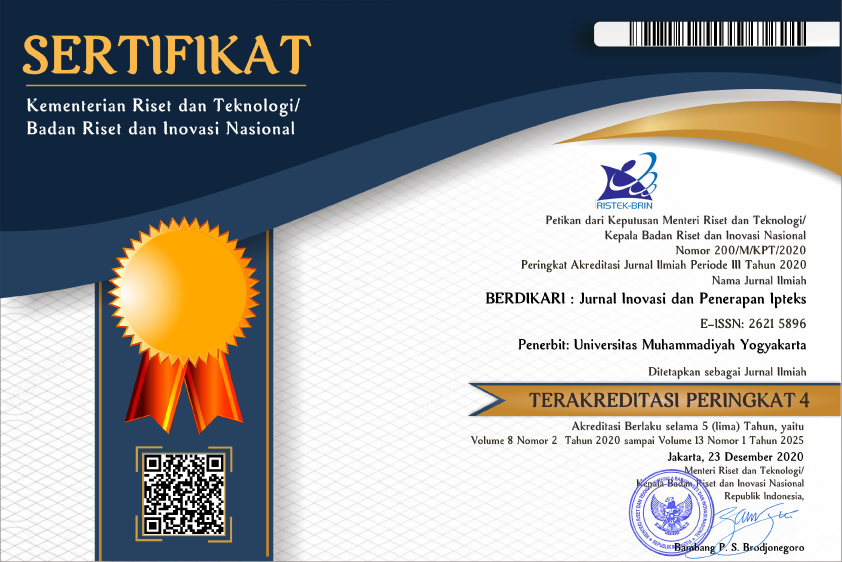Accompaniment of Contextual Learning Oriented Minimum Competency Assessment of Mathematics through Lesson Study
DOI:
https://doi.org/10.18196/berdikari.v11i2.17692Keywords:
contextual learning, mathematics, lesson study, accompanimentAbstract
Minimum Competency Assessment is a component of the assessment as an assessment policy established by the Indonesia government in independent learning to assess the success of formal education in schools. The junior high school of Muhammadiyah 8 Batu has implemented learning innovations. However, it still needs to be improved, especially in integrating the involvement of students in creative and critical thinking, communication, and collaboration, and refers to the Minimum Competency Assessment. This Lesson Study mentoring activity aims to improve the quality of learning mathematics by using a contextual approach oriented to Minimum Competency Assessment. This mentoring activity used workshop and simulation methods. Four mathematics teachers attended the workshop and simulation. The results showed that the Lesson Study team produced a Minimum Competency Assessment for six grade 7 groups oriented contextual learning design that integrated students’ involvement in creative and critical thinking, communication, and collaboration, which was realized through lesson design. Model teachers and observers were enthusiastic and carried out Minimum Competency assessment-oriented contextual learning activities through Lesson Study well. Students gave a positive response and were very active while participating in learning. The mentoring activities of Minimum Competency Assessment-oriented contextual learning can be said to be effective. The learning designs prepared by the teacher can be implemented in other classes with relatively the same student characteristics.
References
Alfin, J., Fuad, A. Z., Nur, M., Yuanita, L., & Prahani, B. K. (2019). Development of group science learning (GSL) model to improve the skills of collaborative problem solving, science process, and self-confidence of primary schools teacher candidates. International Journal of Instruction, 12(1). https://doi.org/10.29333/iji.2019.12110a
Hobri, Septiawati, I., & Prihandoko, A. C. (2018). High-order thinking skill in contextual teaching and learning of mathematics based on lesson study for learning community. International Journal of Engineering and Technology(UAE), 7(3). https://doi.org/10.14419/ijet.v7i3.12110
Indah Nartani, C., Aliim Hidayat, R., & Sumiyati, Y. (2015). Communication in Mathematics Contextual. In International Journal of Innovation and Research in Educational Sciences (Vol. 2).
Irawan Saragih, D., & Surya, E. (2017). Analysis the Effectiveness of Mathematics Learning Using Contextual Learning Model. International Journal of Sciences: Basic and Applied Research, 34(1).
Jazuli, A., Setyosari, P., Sulthon, & Kuswandi, D. (2017). Improving conceptual understanding and problem-solving in mathematics through a contextual learning strategy. Global Journal of Engineering Education, 19(1).
Lestari, F. P., Ahmadi, F., & Rochmad, R. (2021). The implementation of mathematics comic through contextual teaching and learning to improve critical thinking ability and character. European Journal of Educational Research, 10(1). https://doi.org/10.12973/EU-JER.10.1.497
Lubis, M. S. (2020). Pengaruh Pendekatan Pembelajaran Realistic Mathematics Education dan Contextual Teaching Learning terhadap Pemahaman Konsep dan Komunikasi Matematis. Logaritma : Jurnal Ilmu-Ilmu Pendidikan Dan Sains, 7(02). https://doi.org/10.24952/logaritma.v7i02.2119
Rahmayanti, S., Subagiharti, H., & Herawati, T. (2020). EFFECTIVENESS OF LEARNING MATHEMATICS WITH CONTEXTUAL APPROACHES. International Journal Of Multi Science, 1(5).
Silaen, I. A. V, Adriana, M., & Rahayu, R. (2021). Pengaruh Model Pembelajaran Contextual Teaching Learning Dan Realistic Mathematics Education Terhadap Kemampuan Pemahaman Konsep Matematika Dan …. ALACRITY: Journal of …, 1(2).
Taher, N. A. H., Nagaraju, G., & Eslavath, K. D. N. (2019). Motivating students in learning mathematics by using contextual teaching strategies. International Journal of Advanced Science and Technology, 28(13).
Tohir, M. (2019). Empat Pokok Kebijakan Merdeka Belajar. In Kementerian Pendidikan Dan Kebudayaan.
Velani, F. Y., & Retnawati, H. (2020). Application of contextual teaching and learning approaches in improving mathematics interest and learning achievement of elementary school students. Journal of Physics: Conference Series, 1511(1). https://doi.org/10.1088/1742-6596/1511/1/012032
Williams, D. L. (2022). The What, Why, and How of Contextual Teaching in a Mathematics Classroom. The Mathematics Teacher, 100(8). https://doi.org/10.5951/mt.100.8.0572
Downloads
Published
Issue
Section
License
Copyright
Authors retain copyright and grant BERDIKARI Jurnal Inovasi dan Penerapan IPTEK the right of first publication with the work simultaneously licensed under an Attribution 4.0 International (CC BY 4.0) that allows others to remix, adapt and build upon the work with an acknowledgment of the work's authorship and of the initial publication in BERDIKARI Jurnal Inovasi dan Penerapan IPTEK.
Authors are permitted to copy and redistribute the journal's published version of the work (e.g., post it to an institutional repository or publish it in a book), with an acknowledgment of its initial publication in BERDIKARI Jurnal Inovasi dan Penerapan IPTEK
License
Articles published in the BERDIKARI Jurnal Inovasi dan Penerapan IPTEK) are licensed under an Attribution 4.0 International (CC BY 4.0) license. You are free to:
- Share — copy and redistribute the material in any medium or format.
- Adapt — remix, transform, and build upon the material for any purpose, even commercially.
This license is acceptable for Free Cultural Works. The licensor cannot revoke these freedoms as long as you follow the license terms. Under the following terms:
- Attribution — You must give appropriate credit, provide a link to the license, and indicate if changes were made. You may do so in any reasonable manner, but not in any way that suggests the licensor endorses you or your use.
- No additional restrictions — You may not apply legal terms or technological measures that legally restrict others from doing anything the license permits.




